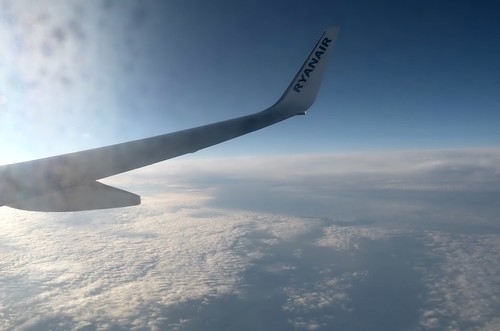This is one of those blog posts that lead people to cancel their subscriptions. I’ve just come back from an academic assignment at one of my almae matres (that’s plural of alma mater, since you ask) — University College Cork. As usual, I flew on Ryanair. Indeed, I had little choice, because I live near Stansted and Ryanair is the only carrier that has scheduled services between there and Cork.
The plane was full on both the outward and return trip. The flights departed and arrived on time. The boarding and disembarking processes were efficient and painless. And the fares were reasonable. And I suddenly fell to thinking: what’s not to like?
At this point, most of my friends, colleagues and acquaintances leap onto my shoulder, where they perch like a flock of cathecising parrots. They complain about, inter alia: Ryanair’s outrageously bumptious CEO, Michael O’Leary; the company’s crassly commercial website with its hidden (and pop-up) traps for the unwary (for example the one that makes the choice of travel insurance a default which can only be turned off by hunting though a drop-down list of countries; or by having non-optional pop-ups trying to flog you car hire or hotels); its fierce restrictions on cabin-baggage (and the brusque way they are enforced by staff); the way it charges extra for everything (speed-boarding, seat-reservation, even the mandatory online check-in); how it adds an “administration fee” for using a non-Ryanair credit card when booking; the intrusive (and idiotic) inflight audio ads for scratch cards, phone cards and coach tickets; the bumpy touch-downs it incentivises in order to achieve rapid turnaround of planes; the canned trumpet fanfare that announces “yet another on-time arrival”; and lots more complaints that I’ve heard but cannot at the moment recall. Listening to this chorus of disdain and disapproval it’s easy to slip into the cliched view of Ryanair as the company that everybody loves to hate.
There’s just one problem with this. How come that Ryanair’s planes are always full? Last year Ryanair carried 79 million passengers, operated 300 aircraft on 1,500 routes. It had fewer cancellations than any other carrier and mishandled far fewer bags than any of its competitors. (The worldwide average for mishandled bags is 9 per 1000; Ryanair’s is less that 0.5 per 1000). If people really hate the company, then they have an odd way of showing it.
I suspect that the cognoscenti’s distaste for Michael O’Leary’s enterprise has something to do with the fact that he stripped away the romantic and exclusive aura that surrounded air travel during the era when it was an expensive mode of travel available only to a tiny elite. When I was a child in the 1950s, for example, only the rich — or company executives who were not paying for their tickets — flew. The Irish national airline (state-owned Aer Lingus) was a glamorous outfit, and a career as an Aer Lingus “Air Hostess” was much prized. (My first father-in-law wanted his daughters to be Air Hostesses because he thought that this would provide them with a fool-proof way of landing rich husbands. Both girls grew up to be militant feminists, I am glad to report.) Every Autumn a fixture on Irish fashion-editors’ calendars was the show in which Aer Lingus displayed the new outfits — designed by some fancy couturier — that their airborne stewardesses would be wearing that year.
But it was much the same in most other countries. National airlines were national flagships. And passengers were treated like royalty. In 1968, as a result of a reservation error, I was once upgraded onto First Class on an Aer Lingus morning flight from London to Dublin, and was astonished to find myself being offered unlimited quantities of champagne. But of course this royal treatment never came cheap. The implicit deal was that you paid through the nose for the privilege of air travel, but that lots of extras — together with sycophantic service and champagne — came with the ticket.
Ryanair’s original sin was to call this bluff. It was the first European airline to recognise that air travel had become a routine commodity. And one of the first (after the sainted Freddie Laker) to realise that if air travel were realistically priced then ‘ordinary’ people would become frequent fliers. Michael O’Leary’s fixed strategy ever since has been relentlessly to pare away the romantic illusions and charge people on an itemised basis for anything over and above their seats. And although they might not like this, passengers recognise that the deal they are getting is at least an honest one.
Ryanair has changed my life for the better. It has made it immeasurably easier to keep in touch with my extended family — who live up and down the Western seaboard of Ireland. In the old days, a journey from Cambridge to there was a two-day affair, involving a long car journey to Holyhead, a three-hour ferry voyage, and then a four or five-hour drive from Dublin. Same story on the return journey. Not surprisingly, we didn’t go back very often. But when the regional airports in the West opened up — Knock in Mayo and Farranfore in Kerry — Ryanair immediately offered scheduled services to both. (Aer Lingus, needless to say, snootily declined to service such low-rent locations.) And where Ryanair went, my kids and I followed. As a result, the family dislocation that used to follow emigration was reduced or dissolved, something that IMHO has been an unmitigated blessing.
So you can perhaps see why I’ve begun to bristle when I hear the well-bred distaste for Mr O’Leary’s airline being endlessly rehearsed. You may not like his style, or how he does business, but at least Ryanair does what it says on the tin.

